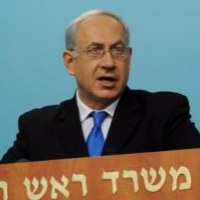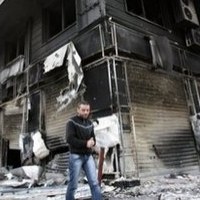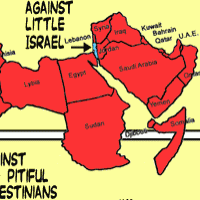Sun, July 11, 2010 | Intelligence and Terrorism Information Center
Senior Hamas figures, especially Khaled Mashaal, reveal their intention to exploit the flotilla as part of their campaign to delegitimize Israel, continuing their commitment to jihad. They reject the Israeli easing of restrictions and make it clear that their priority is not humanitarian assistance for the Gaza Strip.
1. Senior Hamas figures have represented the affair of the last flotilla as an important political-propaganda victory which not only damaged Israeli-Turkish relations but made a genuine change in the way the international community regarded Israel. However, Hamas is apprehensive lest Israel’s easing of restrictions strengthens international understanding for its motives and increase pressure on the Hamas movement.
2. Statements made by Khaled Mashaal, head of the Hamas political bureau in Damascus, and of other senior Hamas figures, present two objectives, one practical and the other political-strategic:
A. Practically speaking, Hamas wants the complete lifting of the so-called siege, meaning goods would enter and exit the Gaza Strip according to Hamas’s conditions and rules: opening the crossings to the uninterrupted passage of all types of merchandise, including those with military use, banned by Israel; Hamas supervision of the goods entering the Gaza Strip; marginalizing the role of the Palestinian Authority making it easier to smuggle weapons in the future; opening the sea lanes to the Gaza Strip; and opening a route between Judea and Samaria and the Gaza Strip, which would facilitate smuggling weapons. As far as Hamas is concerned, imposing its own rules would strengthen its control over the Gaza Strip at the expense of the Palestinian Authority and promote the continuation of its military buildup.
B. Ideologically and strategically speaking, Hamas wants to exploit the recent events and enlist Arab-Muslim and international support for the flotilla as an expression of what Khaled Mashaal calls “the beginning of the end of Israel.” As far as Hamas is concerned, the world has begun to understand that Israel is a “heavy weight on the interests of both East and West.” Therefore, preference should be given to the campaign to delegitimize Israel and to enlisting the Arab-Muslim world and all the other “lovers of freedom all over the world.” For Hamas, important means to promote the campaign are organizing more flotillas (with much larger numbers of passengers), suing Israel in courts of law, boycotting Israel and holding protest demonstrations and marches (“The flotilla did more for the Gaza Strip than 10,000 rockets.”). Khaled Mashaal, speaking in Arabic on June 28 and in total contrast to his attempts to represent himself as a moderate in interviews in English and before Western audiences, stressed Hamas’ commitment to jihad and the destruction of Israel. He did not mention the need for the humanitarian assistance of the flotillas.
3. While the Palestinian Authority also does not consider the Israel announcement about easing the restrictions on goods allowed into the Gaza Strip as the end of the affair, it wants to prevent Hamas from exploiting the flotilla to become stronger at the expense of the PA. Therefore, senior PA figures demanded additional concessions from Israel (including that the “blockade” be completely lifted and an arrangement instituted for goods to be transported from the Gaza Strip to Judea and Samaria). However on the other, they also demanded a PA presence at the crossings in accordance with the 2005 Agreement on Movement and Access.
4. The Egyptian foreign minister said that the Agreement was “the most logical means” for lifting the so-called siege of the Gaza Strip, but that he doubted whether it could be implemented, in view of the difficulty of achieving a Fatah-Hamas reconciliation. Khaled Mashaal blamed the Palestinian Authority for its attitude toward “breaking the siege,” which he called “not serious,” saying that the Palestinian Authority wanted the siege to continue as a way of exerting pressure on Hamas.
Appendix I
Khaled Mashaal calls for the destruction and delegitimization of the State of Israel (“the Zionist entity”), through various “popular activities,” such as flotillas
1. On June 28, 2010, Khaled Mashaal, head of the Hamas political bureau in Damascus, gave a speech in which he discussed several topics at length, including the issue of the flotillas and their place in the campaign to delegitimize Israel.[1] He did not mention one word about the “humanitarian” need for the flotillas, on the basis of which human rights activists around the world have been recruited.
2. He made the following remarks (Al-Aqsa TV, June 28, 2010).
A. The campaign to delegitimize Israel: “Today we have to focus on a way to remove the spurious legitimacy the world gave to the Zionist entity. Israel is illegitimate because it was founded on the illegal occupation of our Palestinian and Arab land. Today the conscience of the world has awakened.”
B. Giving priority to delegitimizing Israel: “Today we—the Palestinians, Arabs Muslims and freedom-loving peoples of the world—have to focus on the following priorities: delegitimizing Israel and maximizing the exploitation of the rage of the world against Israel so that Israel knows the region and the world will vomit it out [sic]…”
C. The nature of the struggle against Israel and objection to negotiations with it: “…Negotiations with Israel only improve its image without the Palestinians’ getting anything in return. The clash with Israel [is carried out] through war, the resistance [i.e., terrorist campaign] and battle or mass action such as flotillas. [It is also carried out by] those who demonstrate solidarity against the fence and the settlements [i.e., “popular resistance” of the sort exhibited at Ni’lin and Bila’in] and the way the confrontation is conducted in Jerusalem – within the clash Israel is the one which exposes the extent of its crimes…”
D. The end of relations between the Arab countries and Israel: “…It is illogical that the world is furious with Israel and that some of us continue to be Israel’s friends and continue to maintain relations with it and trust it…”
E. Recent events signify the beginning of Israel’s end: “…We challenge Israel in the region and the world has begin to be angry with it, and therefore I say that Israel has begun the countdown to its end, with the help of Allah. However there is still a need for struggle, jihad, deeds and sacrifice.”
F. All Jerusalem must be under Arab rule: “As for Jerusalem, we want it to be unified by not under the [Israeli] occupation but under the Arab-Islamic flag, with the help of Allah. Jerusalem will be exclusively Arab…”
G. “Breaking the siege of the Gaza Strip” with more flotillas: “…Breaking the siege is a priority and we must compel it by all means, including new flotillas which will be organized in the coming weeks and months, with the help of Allah…I call on the Arab and Muslim people and other lovers of freedom in the world to multiply the number of participants…Together with us, all freedom-loving people around the world have begun to understand how much of a curse Israel is to the world, to its security and interests, and to what extent it is a heavy burden on the interests of both West and East.”
H. Preferring the path of resistance [i.e., violence and terrorism] to negotiations in the confrontation with Israel and in other battle zones: “…A day or two ago we heard that the British insist on urgent negotiations with the Taliban. What a surprise. The fighting and struggle on the ground are what determine the balance of power at the [negotiating] table. That is the message for the political negotiator [i.e., Mahmoud Abbas] and the Arab leaders who support him in direct and indirect negotiations…This is a historic moment, today, after the success of the resistance, which made achievements in Lebanon and Gaza and embarrassed the invading forces in Iraq and now in Afghanistan. Today the path we can rely on is the path of resistance…When we decide our priorities we must insist on the resistance, liberation, our rights, our land, Jerusalem, the right of return, breaking the siege of the Gaza Strip and on renewing the resistance in the West Bank…”
3. In his speech in Damascus before an Arab target audience, Khaled Mashaal dropped the “smile campaign” Hamas has recently used to win over target audiences in Western countries, and reclarified his known basic principles: the aspiration to destroy Israel, opposition to negotiations and employing the weapon of terrorism [the “resistance”]. As far as Hamas in concerned, the concept of worldwide “popular resistance” with the support of human rights organizations does not replace the path of terrorism. However, as far as Hamas is concerned, it has proved itself for the time being and therefore Hamas is willing to use it to undermine the State of Israel’s legitimacy.
Appendix II
Hamas reactions to the Israeli government’s decision to ease the restrictions on the Gazans and statements concerning future flotillas
1. Senior Hamas figure Mahmoud al-Zahar related to the flotillas in an interview with the British Independent (June 28, 2010):
A. He said Israel should expect many more flotillas in the coming months (including some from the Gulf States). He expected, he said, that other ships would sail for the Gaza Strip after the last World Cup game on July 11 and during the Muslim holy month of Ramadan (which begins on August 11).
B. He was strongly critical of the boycott the Arab states had imposed on the Gaza Strip for the past four and a half years since Hamas won the elections. However, he expressed satisfaction with the pressure exerted on Israel by the International Quartet to ease the “siege” of the Gaza Strip, calling it “a big change.” The change, he said, resulted from the “popular discontent” of the Arab countries, which was manifested by the flotillas.
2. Hamas activists interviewed by the Wall Street Journal on July 2 said that one of the lessons of the flotilla was the importance of using the tactic of civil disobedience, protest marches, legal suits and boycotting Israel. Aziz Dweik, a member of the Hamas faction of the Palestinian Legislative Council in Judea and Samaria said that “The Gaza flotilla has done more for Gaza than 10,000 rockets.” Salah Bardawil from the Gaza Strip, a Hamas delegate in the Palestinian Legislative Council , said that Hamas had begun to value the importance of international support to gain legitimacy as the representative of the Palestinian people. He said “”Hamas used to believe [international support] was just empty words…Today it is very interested in international delegations…and in bringing Israeli officials to justice through legal proceedings” [ITIC emphasis].
3. Senior Hamas figures were critical of the Israeli government’s announcement that restrictions would be eased:
A. Ismail Haniya, head of the de facto Hamas administration in the Gaza Strip, said that Hamas rejected Israel’s attempts to “prettify the blockade and strengthen it in a new form.” He said that Hamas strived for a total removal of the siege. He added that Gaza was not alone by virtue of the expressions of solidarity and public opinion, which have led to Israel’s position regarding the siege to be almost at the breaking point (Hamas’ Palestine-info website, June 18, 2010).
B. Ismail Haniya, interviewed by Al-Islam Al-Yawm on June 26, was asked to comment on Israel’s agreeing to allow into the Gaza Strip the humanitarian assistance of the last flotilla. He said that “the basic problem is not the assistance itself, despite its importance and the Palestinians’ need for it, but the issue of the blockade, which we demand to end in its entirety. We refuse to turn the problem into a solely humanitarian issue…” He added that “Israel wants to end the crisis with as little damage [to itself] as possible, and the way it has chosen to do so is by easing the conditions of the blockade.”
C. Taher al-Nunu, spokesman for the de facto Hamas administration, said that Israel was trying to fool the world, and called the decision to ease the restrictions “throwing sand in the eyes [of the world].” He repeated Hamas’ demand for a complete end to the blockade, including the restrictions on the entrance of building materials, and not for easing restrictions (Safa News Agency, June 17, 2010).
4. Jamal al-Khudari, head of Hamas’ Popular Committee to Break the Siege (and who is in contact with Hamas-supporting organizations and activists around the world), also criticized Israel’s decision. He claimed that the Gaza Strip needed 800 truckloads a day, not the 100 Israel has been sending in. He said that lifting the siege had four stages: opening the crossings into the Gaza Strip, allowing all types of merchandise in (including raw and building materials), opening a route for Palestinians between the Gaza Strip and Judea and Samaria, and opening sea lanes under international inspection (Popular Committee to Break the Siege website, June 20, 2010). On another occasion he called for an Islamic conference in Damascus to decide on an “intifada of ships” to the Gaza Strip as a means of breaking the “siege” (Qudsnet website, June 29, 2010).
Appendix III
The Essence of the 2005 Agreement on Movement and Access
1. The Agreement on Movement and Access, known as the crossings agreement, was signed by Israel and the Palestinians on November 15, 2005, after Israel’s unilateral disengagement from the Gaza Strip and with the prodding of International Quartet representative James Wolfensohn and the American administration. At the same time an Agreed Principles for the Rafah Crossing agreement was signed, which dealt in detail with that crossing. According to the agreement the Rafah crossing would be operated by Egypt and the Palestinian Authority under European Union supervision. It stated that a joint Israeli-Palestinian coordination room would receive video images and other data in real time to make it possible to monitor the implementation of the agreement. It also determined contacts between the Gaza Strip and Judea and Samaria, and called on Israel not to interfere with the operation of the port. It mentioned that the importance of building an airfield had been agreed on, and that talks would continue concerning its security arrangements.
2. Implementing the agreement was abandoned after Hamas’ violent takeover of the Gaza Strip in June 2007, which involved the suppression of the security services which supported Mahmoud Abbas, including those which were supposed to oversee the Rafah and Gaza Strip-Israel crossings. Hamas’ military buildup and the massive rocket attack which preceded Operation Cast Lead also contributed to making the Agreement on Movement and Access redundant.
Note:
1 The speech was given in Damascus to an audience of senior Hamas figures as part of a conference entitled “The student movement among prisoners in occupation jails and its role in defending Jerusalem and national Palestinian project.”



 RSS
RSS











Hamas Calls for the Destruction and Delegitimization of the State of Israel #israel #hamas #gaza http://j.mp/9QTbla
Ruth Lapidoth, Professor Emeritus of International Law at the Hebrew University of Jerusalem, writes on “The Legal Basis of Israel’s Naval Blockade of Gaza”:
“Stopping the flotilla heading for Gaza in international waters 100 kilometers from Israel was not illegal; in time of armed conflict, ships intending to breach the blockade may be searched even on the high seas. Israel is in full compliance with international law because it fulfilled all of the conditions for a lawful blockade.”
http://www.jcpa.org/JCPA/Templates/ShowPage.asp?DRIT=1&DBID=1&LNGID=1&TMID=111&FID=442&PID=0&IID=4402&TTL=The_Legal_Basis_of_Israel’s_Naval_Blockade_of_Gaza
RT @CrethiPlethi: Hamas Calls for the Destruction and Delegitimization of the State of Israel #israel #hamas #gaza http://j.mp/9QTbla